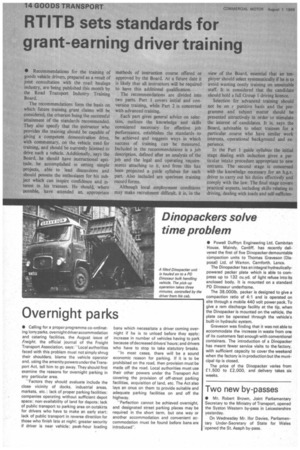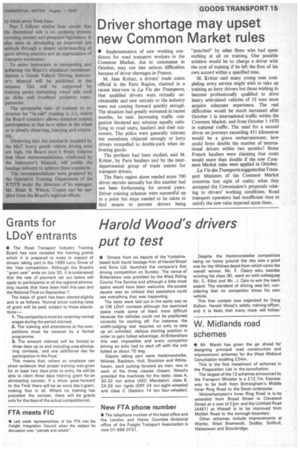TITB sets standards for rant-earning driver training
Page 16

Page 17

If you've noticed an error in this article please click here to report it so we can fix it.
• Recommendations for the training of goods vehicle drivers, prepared as a result of joint consultation with the road haulage industry, are being published this month by the Road Transport Industry Training Board.
The recommendations form the basis on which future training grant claims will be considered, the criterion being the successful attainment of the standards recommended, They also specify that the instructor who provides the training should be capable of giving a competent demonstration drive. with commentary, on the vehicle used for training, and should be currently licensed to drive such a vehicle. Additionally, says the Board,he should have instructional aptitude, be accomplished in setting simple projects, able to lead discussions and should possess the enthusiasm for his sub ject which can inspire confidence and in terest in his trainees. He should, where possible, have attended an. appropriate methods of instruction course offered or approved by the Board. At a future date it is likely that all instructors will he required to have this additional qualification.
The recommendations are divided into two parts. Part I covers initial and conversion training, while Part 2 is concerned with advanced training.
Each part gives general advice on selection, outlines the knowledge and skills considered necessary for effective job performance. establishes the standards to be achieved and suggests ways in which success of training can be measured. Included in the recommendations is a job description, defined after an analysis of the job and the legal and operating requirements attaching to it, and from this has been projected a guide syllabus for each part. Also included are specimen training record forms.
Although local employment conditions may make recruitment difficult, it is. in the view of the Board, essential that an employer should select systematically if he is to avoid wasting costly training on unsuitable staff. It is considered that the candidate should hold a full Group I driving licence.
Selection for advanced training should not be on 2 punitive basis and the programme and subject matter should be presented attractively in order to stimulate the interest of candidates. It is, says the Board, advisable to select trainees for a particular course who have similar work interests, operational background and experience.
In the Part I guide syllabus the initial stage dealing with induction gives a particular intake procedure appropriate to new entrants. The second stage is concerned with the knowledge necessary for an h.g.v. driver to carry out his duties effectively and comply with the law. The final stage covers practical aspects, including skills relating to driving, dealing with loads and self-sufficien cy when away from base.
Part 2 follows similar lines except that the theoretical side is an updating process covering current and proposed legislation. It also aims at developing an improved job attitude through a deeper understanding of good driving practice and an appreciation of transport economics.
To assist instructors in interpreting and achieving the Board's stipulated recommen dations a Goods Vehicle Driving Instructor's Manual will be published in the autumn. This will be supported by training packs containing visual aids such as slides and overhead projector transparencies.
The acceptable ratio of trainees to instructor for "in-cab" training is 2:1, which the Board considers allows complete trainee participation in that he is either at the wheel or is closely observing, learning and criticizing.
Observing that the stlintlards required by the MoT heavy goods vehicle driving tests are high, the Board says it firmly believes that these recommendations, reinforced by the Instructor's Manual, will enable the haulage industry to achieve these standards.
The recommendations were prepared by the Operative Training Department of the RTITB under the direction of its manager, Mr. Brian B. Wilson. Copies can be supplied from the Board's regional offices.


































































































